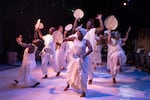What does protest mean to you?
That’s what the performers at Portland Playhouse are looking to explore in their new production, “Sounds of Afrolitical Movement.”
Portland Playhouse in Northeast Portland’s King Neighborhood has long played an important role in providing a safe space for Black and Indigenous people of color to share their stories on the stage.
Past productions included plays like Robert O’Hara’s “Barbecue” and August Wilson’s “Fences.”
“Sounds of Afrilotical Movement,” examines the history of protest and resistance through movement and songs of the African diaspora.

In this provided photo, the "Sounds of Afrolitical Movement" ensemble performs on a Thursday night. Each night of the production's run, performances have centered around a different theme. Thursdays shows focus on baptism and birth.
Courtesy Shawnte Sims
Ramona Lisa Alexander co-created the production with Oluyinka Akinjiola, Darrell Grant and Charles Grant. She said the impetus for creating this production came from exploring the meaning of “protest.”
“What is our personal relationship to protest?” Alexander said. “And I believe that we have not necessarily answered this question, but that the embodiment of protest, or the impact of protests is really what the exploration actually has been.”
The production runs through Sunday, and every night it explores a different form of protest.
The audience is encouraged to participate every day. Every performance starts outside the playhouse, a critical part of the experience, Alexander said.
“When we think about the religions of the African diaspora, nature is such a very important element. And so being amongst the trees, being outside, being in the air, we start outside, we start standing, we start together in a group.” Alexander said.
On Wednesdays, performers have explored the powerful movements from African American spirituals like “Wade in the Water,” and ring shouts, religious rituals first practiced by African slaves from the West Indies and the United States.
On Thursdays, audience members are exploring themes around baptism and rebirth. Fridays are about exploring resistance through stillness. Saturdays are all about acceptance.
“How do you accept yourself in the fullness, in your queerness, in your whateverness, that you could come as you are and move your body together and dance?” Alexander said.

In this provided photo, actors Marcus Lattimore, left, and Elijah Sims perform onstage at Portland Playhouse. Portland Playhouse's new production, "Sounds of Afrolitical Movement," explores different movements of protest and resistance from the past, present and future, and encourages the audience to participate as a way of protest, and healing.
Courtesy Shawnte Sims
Actor and poet Marcus Lattimore plays the character Ole Goon.
The project piqued his interest in theology and allowed him to learn more about his own history.
“I have an appreciation for the creators of this project, because it’s vast and it really is a mental, emotional, physical, spiritual journey for everybody who comes and experiences it,” he said.
The show opened May 24, and audience reactions have been largely positive.
According to Alexander, there has usually been a small level of discomfort from the audience at the beginning of each performance, but by the end of the show, audience members are fully invested in the experience.
“They’re swaying, their hands are moving back and forth. They’re clapping along to the beat. Some are shooting up in their seats out of joy,” Alexander said.
Alexander and Lattimore recalled one moment with a young child on stage who captured everyone’s attention.
“We had a baby in the show one night and she sang with us the whole time. She was just communicating with us. It was amazing when they were laying on the floor, it’s almost like she was like, ‘Get up. It’s OK!’” Alexander said.
“What I saw in the baby was a presence that you just don’t see on a daily basis. You could see her eyes were locked in on every movement that was going on,” Lattimore said.
Ultimately, Alexander and Lattimore want audience members to find their own definitions of protest and resistance and they also hope the experience offers a path of solace.
“I would want people to walk away feeling lighter in terms of any personal burdens that they might be carrying. And through the journey, maybe experience a bit of release,” Alexander said.
